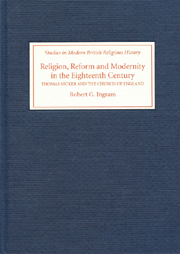Book contents
- Frontmatter
- Contents
- Dedication
- Preface
- Abbreviations
- 1 ‘Efforts at Amendment’
- 2 Becoming an Anglican
- 3 Becoming an Insider
- 4 The Church and the Enlightenment
- 5 The Church and the Parishioners
- 6 The Church and the State
- 7 The Church and America
- 8 The Church and Churches Abroad
- Epilogue
- Bibliography
- Index
- Previously published volumes in this series
1 - ‘Efforts at Amendment’
Published online by Cambridge University Press: 12 September 2012
- Frontmatter
- Contents
- Dedication
- Preface
- Abbreviations
- 1 ‘Efforts at Amendment’
- 2 Becoming an Anglican
- 3 Becoming an Insider
- 4 The Church and the Enlightenment
- 5 The Church and the Parishioners
- 6 The Church and the State
- 7 The Church and America
- 8 The Church and Churches Abroad
- Epilogue
- Bibliography
- Index
- Previously published volumes in this series
Summary
The eighteenth century has long been an era in which historians of England have glimpsed important lessons about their own present. For Victorian whigs and liberals, it was Falstaff to the nineteenth century's Henry V, a debauched and discredited age which stood in stark contrast to their own. ‘Modernists’ in the twentieth century likewise found the eighteenth century useful for contemporary purposes, fighting in it a proxy war over the purpose of history and the nature of the English state. In the last four decades, the eighteenth century has lost none of its instructive appeal, with historians giving it a place in the manger in the creation story of the modern world.
That story runs something like this. In 1660 or 1688 or 1714 or sometime thereabout, the early modern world ceded way to the modern one. Everywhere one looked, one saw modernity itself either present or fast-approaching over the horizon – we are assured, in fact, that the English ‘were obsessed by modernity’. Whether or not eighteenth-century English men and women fixated on modernity is debatable, but there can be no doubt that historians of the period have made elucidating its origins the primary – indeed, seemingly the only creditable – historiographical theme worth pursuing. The Glorious Revolution, then, was a modern nationalist revolution, not a religiously inspired coup d'état. Drawn after 1688 into a second Hundred Years' war against France, an English fiscal-military state evolved complete with a modern-looking bureaucracy and tax system to finance and direct the war effort.
- Type
- Chapter
- Information
- Religion, Reform and Modernity in the Eighteenth CenturyThomas Secker and the Church of England, pp. 1 - 18Publisher: Boydell & BrewerPrint publication year: 2007



